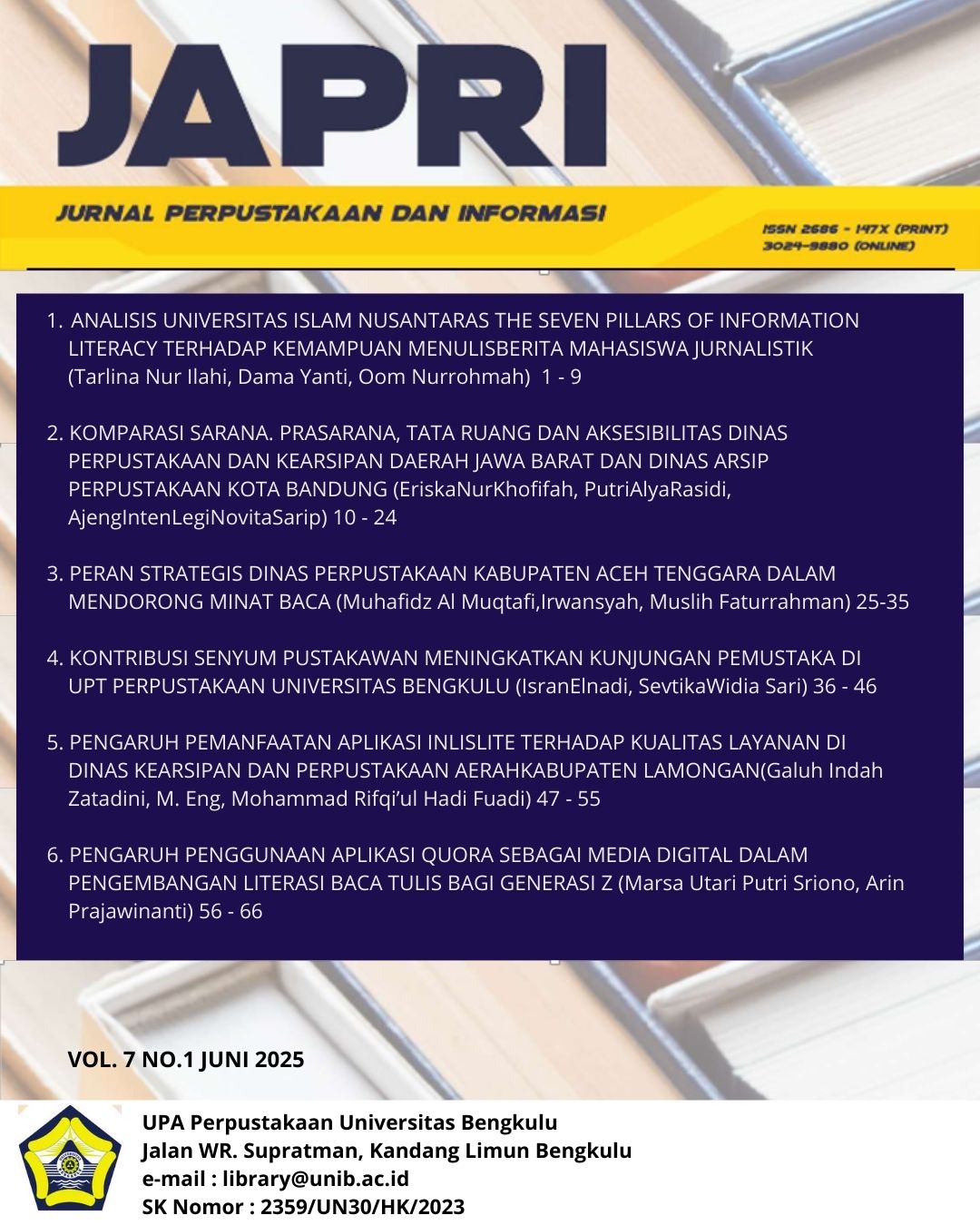Main Article Content
Abstract
The impact of the issue of the industry 4.0 phenomenon with the emergence of digital media and technological developments is the Quora application which can be used to develop literacy which emphasizes experience of various subjects based on data, facts and practical knowledge. This research was conducted to find out how the use of the Quora application as digital media influences the development of reading and writing literacy for generation z. This research uses the technology acceptance model theory put forward by Davis and the theory of the national literacy movement put forward by the Ministry of Education and Culture. This research uses a positivism paradigm and a quantitative approach by conducting observations, distributing questionnaires and documentation. The sample used in this research was 100 respondents who were Generation Z users of the Quora application using a purposive sampling technique, namely where the researcher chose the sample based on research knowledge about the sample to be selected. Data was obtained through distributing questionnaires to respondents. Data validity testing was carried out by conducting validity and reliability tests on 30 statement items with valid and reliable results. Meanwhile, power analysis techniques are carried out using normality tests, linearity tests, correlation tests and hypothesis tests. This research uses a simple linear regression analysis technique to test the research hypothesis by conducting a coefficient of determination test and a t test. The results of the R square calculation are 0.529, which shows that there is a correlation between the use of the Quora application as digital media and the development of reading and writing literacy for generation Z, which is 0.471, influenced by other variables outside the research. The research results show that there is a good influence of using the Quora application as digital media in developing reading and writing literacy for generation Z.
Keywords
Article Details
References
-
DAFTAR PUSTAKA
Davis, F. D. (1989). Perceived usefulness, perceived ease of use, and user acceptance of information technology. MIS Quarterly: Management Information Systems, 13(3), 319–339. https://doi.org/10.2307/249008
Davis, F. D., Bagozzi, R. P., & Warshaw, P. R. (1989). User Acceptance of Computer Technology: A Comparison of Two Theoretical Models. Management Science, 35(8), 982–1003. https://doi.org/10.1287/mnsc.35.8.982
Hastini, L. Y., Fahmi, R., & Lukito, H. (2020). Apakah Pembelajaran Menggunakan Teknologi dapat Meningkatkan Literasi Manusia pada Generasi Z di Indonesia? Jurnal Manajemen Informatika (JAMIKA), 10(1), 12–28. https://doi.org/10.34010/jamika.v10i1.2678
Kemendikbud. (2017). Materi Pendukung Literasi Baca Tulis. 1–40.
Nabila, L. N., Utama, F. P., Habibi, A. A., & Hidayah, I. (2023). Aksentuasi Literasi pada Gen-Z untuk Menyiapkan Generasi Progresif Era. Journal of Education Research, 4(1), 28–36.
Prof. Dr. Sugiyono. (2013). Metode Penelitian Kuantitatif Dan Kualitatif Serta R&D. In Alfabeta, CV (Issue April).
Rizky Anisa, A., Aprila Ipungkarti, A., & Kayla Nur Saffanah, dan. (2021). Pengaruh Kurangnya Literasi serta Kemampuan dalam Berpikir Kritis yang Masih Rendah dalam Pendidikan di Indonesia. Conference Series Journal, 01(01), 1–12.
Selvia, D. R. (2023). EVALUASI PROGRAM LITERASI BACA TULIS DI RUMAH BACA TERAS TALENTA KECAMATAN PADANG UTARA KOTA PADANG. Skripsi. Universitas Negeri Padang.
Siregar, S. (2017). Metode Penelitian Kuantitatif Dilengkapi Dengan Perbandingan Perhitungan Manual & SPSS. 38.
Smith, L., & Niker, F. (2021). What Social Media Facilitates, Social Media should Regulate: Duties in the New Public Sphere. Political Quarterly, 92(4), 613–620. https://doi.org/10.1111/1467-923X.13011
Wibowo, A. (2012). Kajian tentang Perilaku Pengguna Sistem Informasi dengan Pendekatan Technology Acceptance Model (TAM). Proceeding Book of Konferensi Nasional Sistem Informasi, April 2008, 1–8.
Zimba, M. (2019). Analysis of Students’ Perception of Good Mathematic Teachers and Teaching Using Informal Conversations from Twitter and Quora.
References
Davis, F. D. (1989). Perceived usefulness, perceived ease of use, and user acceptance of information technology. MIS Quarterly: Management Information Systems, 13(3), 319–339. https://doi.org/10.2307/249008
Davis, F. D., Bagozzi, R. P., & Warshaw, P. R. (1989). User Acceptance of Computer Technology: A Comparison of Two Theoretical Models. Management Science, 35(8), 982–1003. https://doi.org/10.1287/mnsc.35.8.982
Hastini, L. Y., Fahmi, R., & Lukito, H. (2020). Apakah Pembelajaran Menggunakan Teknologi dapat Meningkatkan Literasi Manusia pada Generasi Z di Indonesia? Jurnal Manajemen Informatika (JAMIKA), 10(1), 12–28. https://doi.org/10.34010/jamika.v10i1.2678
Kemendikbud. (2017). Materi Pendukung Literasi Baca Tulis. 1–40.
Nabila, L. N., Utama, F. P., Habibi, A. A., & Hidayah, I. (2023). Aksentuasi Literasi pada Gen-Z untuk Menyiapkan Generasi Progresif Era. Journal of Education Research, 4(1), 28–36.
Prof. Dr. Sugiyono. (2013). Metode Penelitian Kuantitatif Dan Kualitatif Serta R&D. In Alfabeta, CV (Issue April).
Rizky Anisa, A., Aprila Ipungkarti, A., & Kayla Nur Saffanah, dan. (2021). Pengaruh Kurangnya Literasi serta Kemampuan dalam Berpikir Kritis yang Masih Rendah dalam Pendidikan di Indonesia. Conference Series Journal, 01(01), 1–12.
Selvia, D. R. (2023). EVALUASI PROGRAM LITERASI BACA TULIS DI RUMAH BACA TERAS TALENTA KECAMATAN PADANG UTARA KOTA PADANG. Skripsi. Universitas Negeri Padang.
Siregar, S. (2017). Metode Penelitian Kuantitatif Dilengkapi Dengan Perbandingan Perhitungan Manual & SPSS. 38.
Smith, L., & Niker, F. (2021). What Social Media Facilitates, Social Media should Regulate: Duties in the New Public Sphere. Political Quarterly, 92(4), 613–620. https://doi.org/10.1111/1467-923X.13011
Wibowo, A. (2012). Kajian tentang Perilaku Pengguna Sistem Informasi dengan Pendekatan Technology Acceptance Model (TAM). Proceeding Book of Konferensi Nasional Sistem Informasi, April 2008, 1–8.
Zimba, M. (2019). Analysis of Students’ Perception of Good Mathematic Teachers and Teaching Using Informal Conversations from Twitter and Quora.
